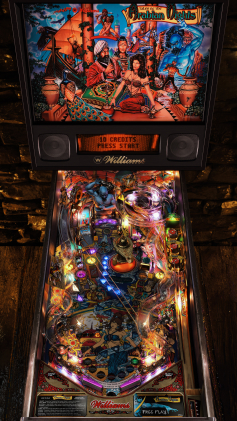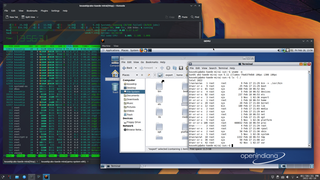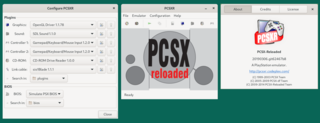
UAE is a computer emulator which emulates the hardware of Commodore International's Amiga range of computers. Released under the GNU General Public License, UAE is free software.

MAME is a free and open-source emulator designed to recreate the hardware of arcade game systems in software on modern personal computers and other platforms. Its intention is to preserve gaming history by preventing vintage games from being lost or forgotten. It does this by emulating the inner workings of the emulated arcade machines; the ability to actually play the games is considered "a nice side effect". Joystiq has listed MAME as an application that every Windows and Mac gamer should have.

Visual Pinball ("VP") is a freeware and source available video game engine for pinball tables and similar games such as pachinko machines. It includes a table editor as well as the simulator itself, and runs on Microsoft Windows. It can be used with Visual PinMAME, an emulator for ROM images from real pinball machines.

Nestopia UE - and its predecessor Nestopia - are an open-source NES/Famicom emulator designed to emulate the NES hardware as accurately as possible.

QEMU is a free and open-source emulator. It emulates a computer's processor through dynamic binary translation and provides a set of different hardware and device models for the machine, enabling it to run a variety of guest operating systems. It can interoperate with Kernel-based Virtual Machine (KVM) to run virtual machines at near-native speed. QEMU can also do emulation for user-level processes, allowing applications compiled for one architecture to run on another.
Homebrew, when applied to video games, refers to software produced by hobbyists for proprietary video game consoles which are not intended to be user-programmable. The official documentation is often only available to licensed developers, and these systems may use storage formats that make distribution difficult, such as ROM cartridges or encrypted CD-ROMs. Many consoles have hardware restrictions to prevent unauthorized development.

FCEUX is an open-source Nintendo Entertainment System and Family Computer Disk System emulator. It is a merger of various forks of FCE Ultra.

Intellivision Lives! is a compilation of over 60 Intellivision video games, originally produced by Mattel Electronics and INTV Corporation between 1978 and 1990. Using original game code and software emulation, Intellivision Productions released the compilation on a Windows and Macintosh hybrid CD-ROM in December 1998. Additional versions were then released for the PlayStation 2, Xbox, and GameCube by Crave Entertainment. In 2010, Virtual Play Games released a Nintendo DS version.

The Sega Genesis, also known as the Mega Drive outside North America, is a 16-bit fourth generation home video game console developed and sold by Sega. It was Sega's third console and the successor to the Master System. Sega released it in 1988 in Japan as the Mega Drive, and in 1989 in North America as the Genesis. In 1990, it was distributed as the Mega Drive by Virgin Mastertronic in Europe, Ozisoft in Australasia, and Tectoy in Brazil. In South Korea, it was distributed by Samsung Electronics as the Super Gam*Boy and later the Super Aladdin Boy.

Dolphin is a free and open-source video game console emulator for GameCube and Wii that runs on Windows, Linux, macOS, Android, Xbox One, Xbox Series X and Series S.

PCSX2 is a free and open-source PlayStation 2 emulator for Windows, Linux and macOS that supports a wide range of PlayStation 2 video games with a high level of compatibility and functionality. Although PCSX2 can closely mirror the original gameplay experience on the PlayStation 2, PCSX2 supports a number of improvements over gameplay on a traditional PlayStation 2, such as the ability to use resolutions up to 8 times larger than native, anti-aliasing and texture filtering.

PCSX is a free and open-source, video game console emulator that allows software designed to be used with the Sony PlayStation to run on personal computers. Over the years, development changed hands several times with PCSX-Reloaded (PCSXR) now being the main version. As of 2021, the emulator seems to be no longer under active development. A newer, actively maintained fork of PCSX-Reloaded is PCSX-Redux.

Stella is an emulator of the Atari 2600 game console, and takes its name from the console's codename. It is open-source, and runs on most major modern platforms including Windows, Mac OS X, and Linux. Stella was originally written in 1996 by Bradford W. Mott, and is now maintained by Stephen Anthony.

The Xbox is a home video game console manufactured by Microsoft that is the first installment in the Xbox series of video game consoles. It was released as Microsoft's first foray into the gaming console market on November 15, 2001, in North America, followed by Australia, Europe and Japan in 2002. It is classified as a sixth-generation console, competing with Sony's PlayStation 2 and Nintendo's GameCube. It was also the first major console produced by an American company since the release of the Atari Jaguar in 1993.

Higan is a free and open source emulator for multiple video game consoles, including the Super Nintendo Entertainment System. It was developed by Near. Originally called bsnes, the emulator is notable for attempting to emulate the original hardware as accurately as possible through low-level, cycle-accurate emulation and for the associated historical preservation efforts of the Super NES platform.

RetroArch is a free and open-source, cross-platform frontend for emulators, game engines, video games, media players and other applications. It is the reference implementation of the libretro API, designed to be fast, lightweight, portable and without dependencies. It is licensed under the GNU GPLv3.

RPCS3 is a free and open-source video game console emulator and debugger for the Sony PlayStation 3 that runs on Windows, Linux, FreeBSD and macOS operating systems, allowing PlayStation 3 games and software to be played and debugged on a personal computer. It is being developed in the C++ programming language targeting x86-64 CPUs and features OpenGL and Vulkan as its backend renderers.
Custom firmware, also known as aftermarket firmware, is an unofficial new or modified version of firmware created by third parties on devices such as video game consoles, mobile phones, and various embedded device types to provide new features or to unlock hidden functionality. In the video game console community, the term is often written as custom firmware or simply CFW, referring to an altered version of the original system software inside a video game console such as the PlayStation Portable, PlayStation 3, PlayStation Vita/PlayStation TV, PlayStation 4, Nintendo 3DS and Nintendo Switch. Installing custom firmware on some devices requires bootloader unlocking.

Citra is a free and open-source emulator of the handheld Nintendo 3DS for Windows, macOS, Linux, and Android. Citra's name is derived from CTR, which is the model name of the original 3DS. Citra can run many homebrew games and commercial games.
















